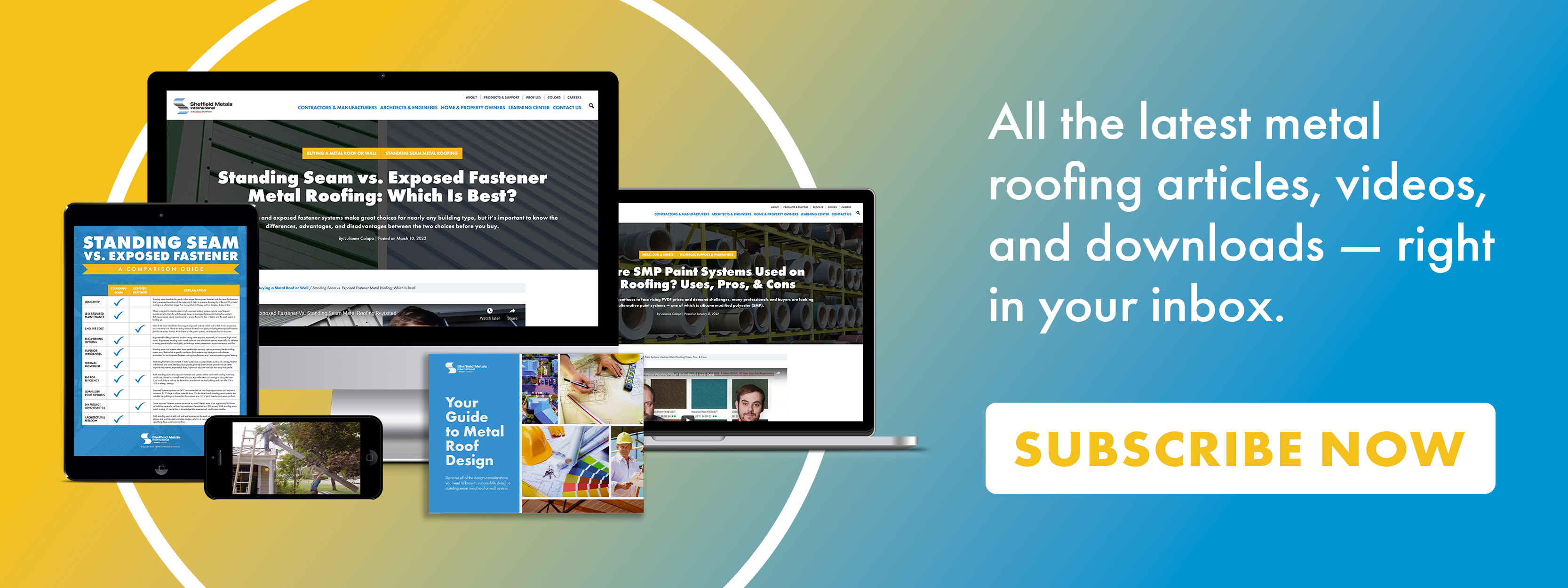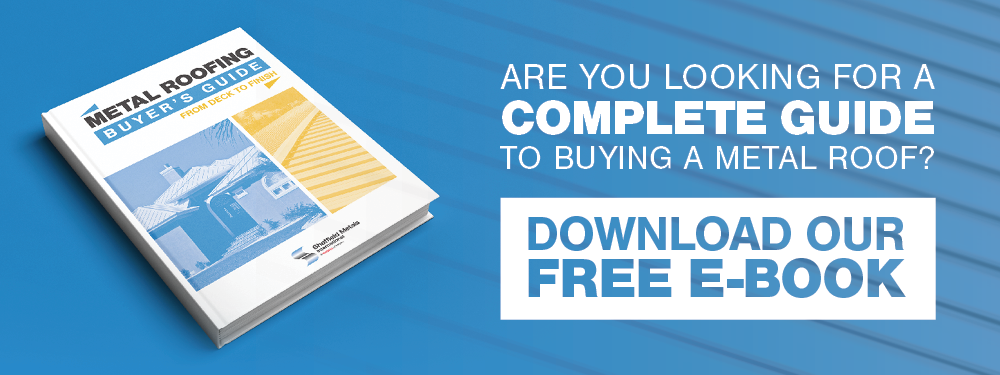If you’re looking in the market to purchase a metal roofing system, there are several metal material options to choose from, including steel, aluminum, copper, zinc, galvanized, and more.
While not as popular as steel (Galvalume), aluminum is a common metal roofing material installed in coastal environments where saltwater is prevalent. That being said, how much do you know about aluminum? Do you know the critical advantages and disadvantages of this metal roofing material?
At Sheffield Metals, we supply painted/bare Galvalume and painted aluminum sheets and coils for the architectural metal roofing and wall industry. We know how important it is for you to be an educated buyer, so let’s dive into the specific details of aluminum and why it may or may not be a good choice for your project.
Ahead in this article, we cover:
- What is aluminum
- Uses for aluminum metal roofing
- Advantages of aluminum metal roofing
- Disadvantages of aluminum metal roofing

What Is Aluminum?
Aluminum is a lightweight, silvery-white metal that is element 13 on the periodic table of elements.
Aluminum is the third most abundant element on Earth and makes up more than 8% of the Earth’s core mass. However, aluminum never occurs in its commonly thought of metallic form in nature. Instead, its compounds, usually aluminum sulfates, are present in nearly all types of rocks, plants, and animals.
According to All In Aluminum:
“Formally, aluminum was produced for the first time in 1824…The discovery of aluminum was made possible when scientists were able to use electricity to break down chemical compounds into their elements. In the 19 century, the Danish physicist Christian Oersted used electrolysis to obtain aluminum. Electrolysis or electrolytic reduction is the process that is used to produce aluminum today as well.”

Today, aluminum is widely used as a product material in various industries, especially:
- Transportation (i.e., automotive, aerospace, locomotive, etc.)
- Containers/packaging (i.e., beverage cans, etc.)
- Construction (i.e., roofing materials, cladding, railings, etc.)
- Electronics and appliances (i.e., electrical wires, washers/dryers, etc.)
Uses for Aluminum Metal Roofing Systems
So how is aluminum used in metal roofing? There are a few key characteristics and uses to point out.
Aluminum sheet and coil products used to make panels are sold according to the thickness in inches (usually in decimal form), so the higher the number/decimal, the thicker the aluminum material. There are varying thicknesses of aluminum; which one you should purchase is often dependent on the application:
- For residential roofing projects: .032” or .030” is most common
- For commercial roofing projects: .040” is most common
- Copings or caps: .050” or .063” is most common
Overall, aluminum is suitable as a roof, wall, trim, and more in several different environments, including coastal environments, hurricane zones, locations with high rain or snowfall, high-temperature regions, and more.

Some common uses for aluminum include:
- Coastal structures – Hotels, condominiums, homes, boathouses, and more
- Commercial buildings – Hospitals, schools, stores, government buildings, and more
- Residential projects – Single-family, multi-family, condominiums, and more
- Architectural structures – Commercial, governmental, residential, and more
- Structural or industrial applications – Warehouses, factories, and more
Benefits of Aluminum Metal Roofing
Self Healing & No Red Rust
Aluminum is unique in how it handles the minimal corrosion it experiences. When it does corrode, it doesn’t red rust as steel does; instead, it oxides and forms hard oxidation (or oxide film) on its coating, which actually protects the aluminum. This helps to preserve the metal and make it last in very corrosive environments, like coastlines. Plus, the oxidation forms rather quickly so there’s no edge creep that eats up the panel like a steel substrate with red rust.
Suitable For Use in Coastal Environments
One of the most significant selling points of aluminum is that it can be installed in coastal environments. As we mentioned, aluminum has much better corrosion resistance than steel products, especially in harsh coastal environments where saltwater can wreak havoc on a metal roofing system. Because aluminum oxidizes as it starts to corrode, it actually makes it stronger and prolongs the life of the system on the coast.
Aluminum is the metal material most commonly installed in the Caribbean Islands (inland and on the coast, as salt residue in the air can cause Galvalume and other steel products to rust), on the Atlantic coastline, the Gulf Coast, and the Pacific Coast.
Best of all, aluminum roofing systems still carry a PVDF paint warranty when installed in coastal areas.

Warrantied Product
With something as important as your roof, purchasing a product that carries a warranty is always recommended. Luckily, aluminum metal roofs come with a variety of warranty options, including paint, substrate, and weathertight warranties, which help to protect your investment and provide peace of mind that the roof or wall system will last. (Note: Check with your manufacturer for specific warranty types and timeframes offered.)
There are even paint warranties on aluminum sheets/coils used in coastal applications. For example, Sheffield Metals offers a 25-year PVDF paint warranty for coastal properties and a 20-year PVDF paint warranty for Caribbean properties.
Plus, commercial property owners can buy a weathertight warranty for their aluminum roofing structure, which ensures the roof was installed correctly and adheres to strict installation details. Learn more about Sheffield Metals’ weathertight warranties in this comprehensive article.
Highly Recyclable
Sustainability in construction has become vitally important in the past 20 to 25 years, which is how metal products rose to prominence. Metal is almost always recyclable in one way or another, and aluminum is one of the most reusable and sustainable metals in the world. For reference, about 95% of all aluminum roofing systems installed worldwide are made from previously recycled aluminum materials. At Sheffield Metals, we use a 3000 series aluminum alloy (3105) primarily made from previously recycled materials and very little pure aluminum.
Aluminum’s high recyclability and reusability are why many architects and building owners choose aluminum for their projects, especially those looking to meet LEED certification requirements. LEED is the most widely used building rating system that provides the framework for “healthy, efficient, carbon and cost-saving green buildings.”
Lightweight
Metal roofing in general is one of the lighter roofing materials, which helps to reduce the added stress on a building’s frame. Aluminum is one of the lightest metal materials, especially when compared to steel products.
For a little background: When you compare gauges and thickness on a weight-per-square-foot basis, 24-gauge Galvalume typically measures as .023” or .024” in thickness. The comparable aluminum thickness is .032” (equivalent to 24-gauge Galvalume in strength), so the aluminum is thicker but only half the weight. A typical 24-gauge Galvalume roof weighs anywhere from 1 to 1.5 pounds per square foot and a .032 aluminum roof weighs less than .5 pounds per square foot.
The lightweight properties of aluminum make it easier for contractors/installers to transport, handle, and get panels onto the roof deck. Plus, if you’re running panels on-site with a portable rollforming machine, a lighter coil can be easier to transport and puts less stress on the machine Note: Keep in mind that because aluminum is thicker, aluminum coils will be slightly less lineal footage.
Readily Available
Aluminum is the third most abundant element in the Earth’s crust and, as discussed before, is usually made from already recycled metals. This makes it a common metal sheet and coil product that many manufacturers carry as part of their standard product lines. Plus, there are many skilled and qualified contractors who know how to properly install aluminum according to the manufacturer’s recommended installation details.
Color Options
Aluminum sheet and coil products usually come in similar, if not the same, color options as Galvalume. So, if your project requires an aluminum panel system, you don’t have to compromise on the color.

Drawbacks of Aluminum Metal Roofing
Easier to Bend or Dent
This drawback is both a benefit and a disadvantage of aluminum. On one hand, aluminum is more malleable than steel, which means it can be bent and manipulated much easier and won’t suffer breaks or cracks as easily. This is helpful during the rollforming and fabrication of panels.
However, since aluminum is a little softer and more malleable, it has been known to dent easier than other metals during and after the installation. Contractors should be extra careful when handling and installing aluminum materials/panels. Additionally, if a structure is beneath trees or other objects that could fall on the roof, another type of metal material may be a better option to help preserve the aesthetic of the roof.
Luckily, the tensile strength of aluminum is comparable to steel, but aluminum is just more susceptible to surface denting.
Medium to High Price Point
Aluminum is in the mid to high price range for material cost, which makes it not the most affordable metal material option. Aluminum standing seam metal roofs come in at a price point of about $7 to $18 per square foot depending on thickness, finish, profile, location, installer, and many other factors.
Keep in mind that in 2021 and 2022, aluminum and steel prices are continually fluctuating, so the price can vary dramatically.
Requires More Space for Thermal Movement
Aluminum expands and contracts roughly twice as much as a steel roof. This is something that contractors need to be aware of during the installation to allow enough room for the thermal movement of the panels. This is especially important when using a mechanically seamed panel in lengths greater than 15-20 feet. For panels this length, it’s recommended that an expansion clip be used in accordance with the applicable engineering.
Restricted expansion and contraction of an aluminum roof can cause oil canning, increased noise, and more required maintenance on any exposed fasteners.
Natural Color
Using a bare aluminum product with its original natural silver-gray color isn’t usually recommended. As the metal ages, experiences weathering, and oxidizes (white rust), it doesn’t hold its original mill-finished color and often becomes washed out and spotty.
The best way to overcome this issue is to buy painted roofing coils or panels, which will age much cleaner over time because the paint covers any of the metal color changes.

Final Thoughts on Aluminum Metal Roofing
Aluminum is a great roofing material for several applications, but it’s still important to know when and where it should be installed.
To recap:
- Aluminum doesn’t red rust and instead forms an aluminum oxide protective coating to heal itself when exposed to corrosive conditions.
- Aluminum is almost always recommended in coastal environments where saltwater is prevalent.
- Aluminum is lightweight and readily available, which makes it easy for installers to handle.
- Aluminum carries several warranty options, including a PVDF paint warranty on the coast and in the Caribbean.
- Aluminum can be easier to dent, is a higher price than steel, and requires adequate space for thermal movement.
Sheffield Metals is dedicated to educating customers and potential buyers so they can make the most informed decision about the best metal material for their roofing project — aluminum or otherwise. Whether you’re a contractor, architect, manufacturer, property owner, or beyond, we can work with you to choose the right material for your project(s).
Contact one of our knowledgeable metal roofing specialists today to ask your questions about aluminum or any other metal roof type!
